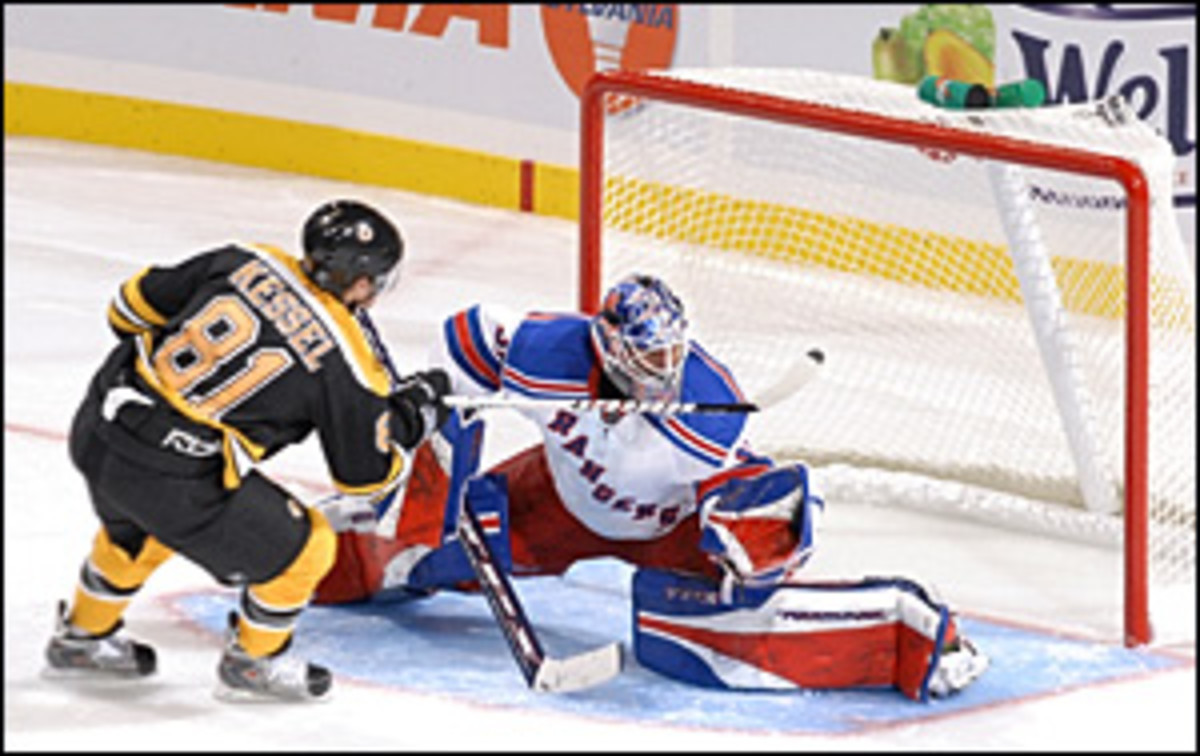
It's a winner
I stand before you today on behalf of Phil Kessel, a man who has been wronged by a woefully outdated system.
You see, Kessel has never scored a game-winning goal in the NHL ranks. At least not according to the NHL. But I swear, after investing the better part of last Saturday afternoon watching his Boston Bruins battle the New York Rangers, it was Kessel I saw streak up the middle up the ice and launch a wicked 15-foot wrister through the wickets of Henrik Lundqvist for a 1-0 victory.
It was a huge goal, a real confidence builder for a team trying to establish itself under new coach Claude Julien. But here's the flip side of the coin: Kessel's tally came during the shootout. And because shootout goals don't count as an official, individual stat, that goose egg under the GWG category stands, while his season goal total idled at three.
That has to change.
After proving through two full seasons to be arguably the most compelling part of the regular season, it's time to talk about taking the training wheels off the shootout. Old-schoolers arguments to the contrary, it's not just a skills exhibition. And it's not a sideshow. This puppy ain't going back to the pound. It's time to start treating it like part of the family.
And that means recognizing the shootout winner as a legitimate goal in the stat column.
A controversial move? Sure. But honestly, is there a more important marker on the night than the one that seals a win in the shootout? You can directly attribute a point in the standings to it, but it's shunned like a redheaded stepchild compared to, say, the lone tally in a 6-1 loss or a last-second empty netter. That's patently unfair to the NHL's most exciting, and most clutch, shooters.
Take Boston's Kessel, for instance. As a rookie seeing limited action last season, he counted 11 goals, none of them official game-winners. But he was an ace when things came to a head in the shootout, connecting on four of seven chances, each one of them a game-decider. That's four points the Bruins banked in the standings directly as a result of Kessel's uncanny ability to bury a puck behind a goaltender. Of course, no one could know that his four "GDGs" ranked second in the league unless they were willing to dig through the NHL's arcane sub-strata of online stats.
When the powers-that-be greenlit the shootout after the lockout, there was trepidation about how it would be accepted, and concern about statistical integrity. But change is a constant in the game's history. At one time or another, the NHL operated with six skaters, didn't allow forward passing, did allow teams to score multiple times on the same power play, and didn't have overtime. All of those rules, when changed, impacted the way goals were scored, records were set and games were decided.
All of those changes elicited howls of protest from the old guard for whom intransigence is worn like a merit badge. And yet, somehow, the game survived.
Hockey isn't alone in needing to reflect the changing times. If you're willing to compare apples to oranges, there's talk that the NBA is exploring the possibility of adding a second assist to its stats package. Purists will moan -- and without that Romero-esque sound, how would we ever recognize them? -- but that debate is motivated by the desire to provide a more accurate interpretation of an important on-court event.
And really, that should be the factor that motivates hockey's tall foreheads to legitimize the shootout goal. Granted, there's no perfect way to account for shootout scoring. A single-goal shootout like Saturday's Boston/New York tilt is the exception, not the rule. And that means some players who cash in on their shootout chances won't see the result in their stats. That's unfortunate, but it's the most reasonable way to deal with it since the final score only recognizes the conclusive goal.
Of course, adding a goal-for means adding a goal-against, and that means the goaltenders' union will be up in arms. Their desire to protect the integrity of their own stats led to the current situation that sees a shootout end with one goalie getting a W while the other essentially gets a tie. Accurate in terms of team points, but not indicative of the final score. We all saw that red light go on.
Netminders have won so many battles lately -- keeping pads far bigger than necessary for protection and putting the kibosh, at least temporarily, on talk of enlarging the nets -- that it's time for them to give a little. Because, really, does Lundqvist deserve credit for a shutout after he gave up the winning goal?
Hockey's a team game first and foremost, but individual recognition has been part of the fabric since Dave Ritchie of the Montreal Wanderers started the scoring one minute into the NHL's debut event. Legitimizing these shootout winners is the right thing to do.
And if nothing else, it'll mean that many more goals are tallied, and the league can talk about how scoring is up, right?





